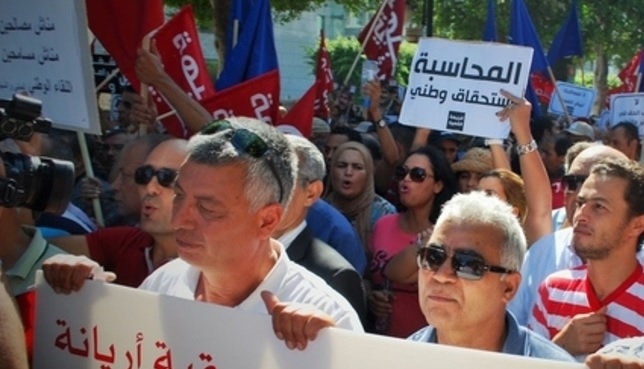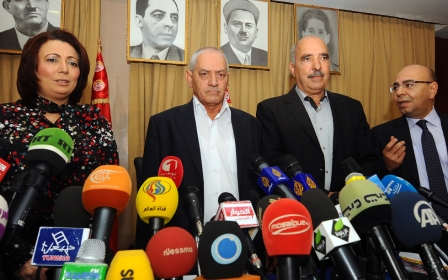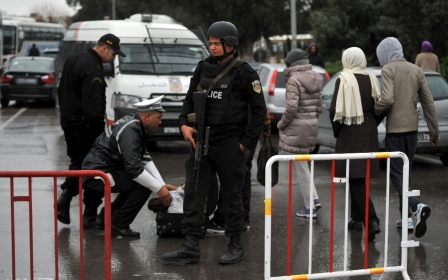ANALYSIS: Amnesty for corrupt businessmen of the Ben Ali era?

TUNIS - "We live a daily social schizophrenia," said Anwar Bassi, lawyer and co-founder of Transparency 25 Collective, a group of 25 lawyers formed in February 2011, shortly after Tunisian leader Zine El Abidine Ben Ali fled the country.
"Corruption has increased in recent years. It symbolises the state’s weakness," Bassi told Middle East Eye.
Since the Tunisian revolution of 2010-2011, several indicators show that corruption levels have increased in the country. It is a form of "crony capitalism," according to several reports issued by the World Bank. The NGO Transparency International even ranked the country 77th in the 2014 corruption perception index.
This is particularly due to certain emergency laws enacted under the former government that are still in force. Legal mechanisms allow for monopoly practices, said Mohsen Akrimi, director of the Industry Promotion Agency (API) of Sidi Bouzid.
"For example, insurance companies’ specifications allow only the sons of chairmen to start an insurance company ... It is the same trend in the travel agency or car rental sectors."
Ashraf Awadi, president of Transparency International and I Watch, says: "Since the revolution, there is a real issue of impunity that has a demoralising effect and prevents one from fighting."
Awadi's organisation, created in the aftermath of the revolution, is campaigning for access to public data information and for transparency in electoral campaign funding.
"Businessmen have such an influence that even the state is incapable of doing anything. They have networks in [governmental] administrations that act on their behalf. Files disappear, court summons take long to be filed. Additionally, there is currently no law that protects whistleblowers, so it's hard to know what is really happening."
"On one hand, the economic elite wants to keep its monopolies and does not want to fight corruption. On the other, we want foreign investors. It cannot work," he added.
The draft of the National Reconciliation Act relating to financial and economic crimes, proposed by Tunisian President Beji Caid Essebsi on 16 July, and meant to be discussed by the People's Representatives’ Assembly in mid-October, may even worsen the situation.
With the declared objective of boosting an economy in recession since September, the text suggests offering amnesty to the businessmen who were involved in corruption that was widespread under Ben Ali’s government. Considered unconstitutional by some, or against the revolution’s objectives and therefore against the transitional justice processes for others, the move has sparked controversial responses among Tunisian public opinion, the opposition and even within the government’s party, Nidaa Tounes.
'Crony capitalism' and petty corruption
According to the World Bank, the establishment of a system of privileges in the Tunisian economy is as old as the country's independence. In fact, the emergence of this system is even older; it predates the modern Tunisian state. It already existed under the French protectorate and even during Ottoman times.
Some areas, such as the Sahel (Monastir, Sousse), Sfax, Hammamet and Tunis, where policymakers are from, were given preferential treatment, particularly during Habib Bourguiba's government, at the expense of the rest of the country. The fact that portions of the economy were held through business cartels run by clan membership has largely determined the economic development of the regions.
In a report published in 2014 entitled "Tunisia’s Unfinished Revolution," the World Bank outlined an uncompromising profile of the Tunisian economy: a lack of competition, monopolies, privileges and whole sectors such as transport, telecommunications, real estate and insurance being monopolised by a few companies that hold 21 percent of the economy but only provide one percent of employment.
These odd situations partly explain the economy’s inability to generate more employment opportunities. Currently, around 60 percent of [university] graduates are unemployed or turn to the informal economy which is steadily growing as well.
These companies, which are not subject to competition, have no performance obligation, and therefore produce lower-quality goods and services. This is important to mention since, despite their low quality, these services are on average 30 percent more expensive than they should be.
Thus, according to the same report, if the ticket fares of Tunisair, the national airline company, are more expensive than the market prices, the additional 30 percent that is paid by passengers represents the amount of the corruption. "Since independence, this company has always been run by the presidents’ wives [two of them] who appointed whomever they wanted to leadership positions. The clientelism was widespread," said a Tunisian company director, on condition of anonymity.
The rise of the clans
The economic monopoly emerged in the early 70s, when the state decided to launch a privatisation programme in order to develop the country. However, the open-door policy on trade has failed to improve the competitiveness of local products.
Several laws were then passed in order to diversify the market, but these new industries were rapidly taken over by clans that were already placed in other sectors. That was the time when the privileges related to investing and monopolising any given sector came to surface.
"We haven’t had a new generation of businessmen to take over," the anonymous entrepreneur added. "After several failed attempts to inject new blood into this generation of businessmen, Ben Ali finally had to deal with the old businessmen by setting up an arrangement, namely maintaining affordable prices and developing the country in exchange for the preservation of their monopolies in various industries. The state did not have the means to invest, but these people did, hence the privileges."
But while privileges were maintained, the development did not take place.
"That's how people got rich; for they had nothing before Ben Ali’s era. These are not businessmen but the mafia. The real businessmen should have spoken up against such practices," said Anwar Bassi.
Since then, many companies that sought to expand into the market were subject to these rules, away from any free competition. In response, some entrepreneurs have set up an "avoidance strategy," by finding a foreign partner in order to avoid having their capital and activity taken over by monopolist clans. Other companies have chosen not to become too important in order to avoid others’ greed.
"What's the point of starting a business if someone comes and takes everything from you? You cannot even complain and have justice done," a young entrepreneur from Sidi Bouzid told MEE on the condition of anonymity.
If laws do not permit openly such monopolies and privileges, then legal loopholes lie in the implantation of such legislation. Additionally, the administrative constraints are often based on territorial interests.
In Gafsa, for example, an entrepreneur founded a private engineering school to bring in the best students of the central-western region that is severely underdeveloped.
Roadblocks to new entrepreneurs
"When I decided to launch this project, I was told: 'If you establish your school in the Sahel [one of the regions where policymakers historically hail from] the procedures will be facilitated, but if you do it in Gafsa, we will throw roadblocks in your way,'" he explained to MEE. He would have received threats from members of the administration in the Ministry of Higher Education, and that was after the revolution.
Moreover, this grand-scale corruption seems to generate smaller incidents of corruption on a daily basis.
Some even practice corruption without being aware of it. A recently published study by the Tunisian Association of Public Controllers (ATCP) states that: "A Tunisian does not categorically refuse petty corruption (estimated at 450mn dinars ($230mn in 2013 in Tunisia). The endorsement of certain practices among Tunisians is very worrying."
According to the ATCP study, although 91 percent of the interviewed respondents call for exposing corruption, 84 percent of victims of corruption acts have never denounced such practices, and 58 percent of surveyed respondents believe they feel powerless. Nearly 30 percent of respondents reported having used some "arrangements" to facilitate administrative procedures.
Transitional justice process undermined
The president’s economic reconciliation bill comes in a fragile economic context. Political instability and deadly attacks by armed groups have scared away many foreign investors. For example, the Bardo (in March) and Sousse (in June) attacks have cost Tunisia 1.8bn euros ($2.04bn), as estimated by the Arab Institute of Entrepreneurs, dealing a fatal blow to the country’s economic pillar - tourism.
However, for NGOs, reviving the country's economy depends above all on its consolidation and the end of illegal practices. As proof, a report issued by Global Financial Integrity shows that between 2002 and 2008, nearly 50 percent of the Tunisian economy has been stained by corruption and mafia practices (kickbacks, bribery, price falsification and criminal activities), with a cost estimated at two percent of the GDP, or about $1.2bn per year.
While, according to the Arab Institute of Entrepreneurs, about 200mn to 600mn dinars would be generated by restitution of money gained through malpractices - a sum which remains very far from the value of the looted property or even the annual cost of corruption - many believe that the fight against the latter must be a priority, a view that doesn’t seem to be shared by President Essebsi and the businessmen clan.
Payment for clean break
The president, through his planned bill, invites the perpetrators of embezzlement to report in a sworn statement the stolen amounts. They will then commit to return the money with an additional five percent withheld paid per year over a fixed period. In return, no legal action shall be taken and no investigation will be conducted to check the authenticity of the revelations made on condition of anonymity.
Additionally, since the interviews are held behind closed doors, victims will neither be allowed to attend the hearings nor appeal decisions. Finally, the committee in charge of the process will be an administrative body dependent on the government, with neither control nor transparency over appointments or decisions.
Therefore, proposing a conditional amnesty to businessmen and officials, who are perpetrators of corruption, will create antagonism between the law on economic reconciliation and the process of transitional justice.
Few complaints have actually been filed on this issue to the Truth and Dignity Forum (IVD), created in the aftermath of the revolution to carry out the transitional justice process, which includes, in particular, compensating for economic and social crimes committed under previous governments between 1956 and 2013.
But so far, of the 16,000 complaints listed by the IVD, only 250 cases are related to financial corruption – including victims as well as businessmen asking for arbitration in order to resolve their disputes in court.
While some talk about a generalised and deeply rooted "omerta" regarding the reporting of crimes of corruption, others argue that this silence is - in part - due to the deterrent effect for complainants of the proposed economic Reconciliation Act, which has been in the pipeline for several months.
"Rumours circulating about the president’s bill since March have stopped the bosses’ proceedings," Seif Soudani, head of communications at the IVD, told MEE. "Currently, a dozen of them are demanding arbitration in order to comply with the law," he added.
The issue of compensation is not mentioned in the economic Reconciliation Act. "In reality, this is a tailored legislation for the former regime’s elite," says Seif Soudani.
Code of silence
In a report published in November 2011, the fact-finding national commission looking into cases of embezzlement and corruption pointed out that between 6,000 and 7,000 administrative officials, still in service, have been involved in illegal practices.
International donors, including the EU, the World Bank and the UN, have expressed reservations about the president’s initiative: "It is not what they asked for," said Soudani. What they asked for, he said, was a consolidation of the business community in order to attract investments, particularly as the banks were recapitalised by foreign donors in June.
"In the end we recapitalise to lend the same people about 800 million dinars paid by the Tunisian taxpayers. Those in favour of the bill are those who used the money to fund the election campaign," he said.
"How do you combat corruption when one knows nothing about it? [The bill] is a bonus to corruption that somehow rewards the perpetrators, who will then repatriate the stolen money," said Anwar Bassi. "The problem is not how to recover the money but how things go, the mechanisms and functioning within the administration. How did they get rich that fast in a country with such a cramped economy?"
Many questions still remain unanswered, such as recovering the ill-gotten gains of the Ben Ali clan, four years after the uprising that had yet given the Tunisian population so much hope for social justice.
Restoring the prestige of the state was the priority that made Essebsi’s electoral campaign a success. However, the state currently seems quite unable to win against rampant corruption. Nevertheless, one of the bill's merits has been to revive the debate on transparency within the business sphere. Who stole and how much? The question is on everyone's mind, and still pending.
This article was translated by Ali Saad and originally published on Middle East Eye’s French page on 06 October 2015
Middle East Eye propose une couverture et une analyse indépendantes et incomparables du Moyen-Orient, de l’Afrique du Nord et d’autres régions du monde. Pour en savoir plus sur la reprise de ce contenu et les frais qui s’appliquent, veuillez remplir ce formulaire [en anglais]. Pour en savoir plus sur MEE, cliquez ici [en anglais].




